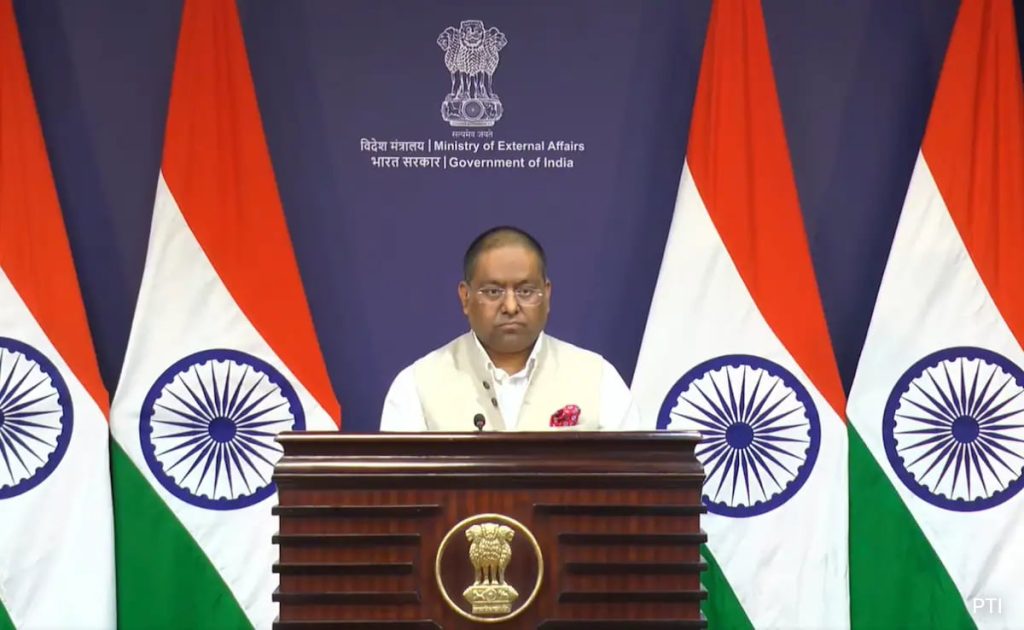New Delhi:
The Ministry of External Affairs spokesperson, Randhir Jaiswal, on Tuesday stated that the global community has shown a clear understanding of India’s plight and recognised that the Pahalgam terrorist attack targeted Indian tourists and that the epicentre of terrorism lies across the border in Pakistan.
He said that numerous foreign leaders have acknowledged India’s right to defend itself and protect its citizens, emphasising that the epicentre of terrorism is in Pakistan.
While addressing a question of India and Pakistan ‘hyphenation,’ Mr Jaiswal, while addressing the MEA briefing, said, “There is widespread understanding in the world that Indian tourists were the victims of terrorism at Pahalgam and that the epicentre of terrorism is across the border in Pakistan. A number of foreign leaders, in their conversations with Indian counterparts, recognised India’s right to defend itself and protect its people.”
He added, “I also draw your attention to the UN Security Council press statement of 25th April, which states that – ‘there is a need to uphold perpetrators, organisers, financiers and sponsors of this reprehensible act of terrorism accountable and bring them to justice.’ They further stressed that those responsible for these killings should be held accountable.”
Mr Jaiswal also spoke about the abeyance of the Indus Water Treaty (IWT) and highlighted that while the treaty was originally founded on the principles of goodwill and friendship, “Pakistan held these principles in abeyance by its promotion of cross-border terrorism.”
“After the CCS (Cabinet Committee on Security) decision, the Indus Water Treaty has been put in abeyance. I would also like to take you back a little. The IWT was concluded in the spirit of goodwill and friendship as specified in the preamble of the treaty. However, Pakistan has held these principles in abeyance by its promotion of cross-border terrorism for several decades now. Now, as per the CCS decision, India will keep the treaty in abeyance until Pakistan credibly and irrevocably abjures its support for cross-border terrorism. Please note that climate change, demographic shifts and technological changes have created new realities on the ground as well,” Mr Jaiswal said.
Mr Jaiswal, during the press briefing, also stated that Pakistan’s attempt to escape the consequences of its actions is futile, given its long history of supporting terrorism. He highlighted that the terrorist infrastructure sites destroyed by India were responsible for the deaths of not only Indians but also many other innocents around the world.
“We have seen the statement made by the Pakistani side. That a nation which has nurtured terrorism on an industrial scale should think that it can escape the consequences is fooling itself. The terrorist infrastructure sites that India destroyed were responsible not only for the deaths of Indians but also of many other innocents around the world. There is now a new normal. The sooner Pakistan gets used to it, the better,” he said.
Mr Jaiswal’s remarks came after Pakistan’s Foreign Minister, Ishaq Dar, in his first interview since India and Pakistan’s cessation of hostilities, said that Islamabad “had no choice” but to launch strikes in “self-defence” following India’s May 7 cross-border attacks.
Dar referred to India’s strikes as a “war” and a “wishful attempt to establish its hegemony” and claimed that “We were very sure that our conventional capacity and capabilities are strong enough that we will beat them both in the air and on the ground.”
(Except for the headline, this story has not been edited by NDTV staff and is published from a syndicated feed.)
The post India Says Global Community Recognises Pakistan As “Epicentre Of Terrorism”: appeared first on World Online.

